PAN Germany Project
Malaria control
For effective and lower-risk malaria control
Malaria. Solutions.
Malaria is one of the major global health problems. Every year, an estimated 660.000 people die from malaria. And most of these deaths are in Africa. To date, control programs to fight malaria have been based on three different interventions: a) the use of insecticide treated bed nets, b) spraying insecticides - including DDT – indoors and c) medical treatment of malaria victims and pregnant women.
The chemicals applied - especially DDT - pose established and suspected risks for human health and the environment and drugs as well as insecticides can become ineffective through development of resistance - by mosquito vectors to insecticides and by parasites to pharmaceuticals. The widely-banned pesticide DDT is still used in many countries to control the vectors of malaria, even though the legally binding Stockholm Convention on Persistent Organic Pollutants (POPs) calls for its global elimination.
In order to support effective and lower-risk malaria control measures, PAN Germany provides information and supports non-chemical approaches to malaria control on field level.
Information on malaria control, the use of DDT and non-chemical approaches to malaria control can be found in the right column and here
New tools to defeat malaria.
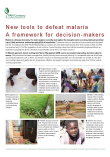 Strategies to combat malaria need to relate to people’s lives and livelihoods to reduce exposure to harmful pesticides and eliminate the use of DDT. A new decision-making framework guides donors, programme initiators and project managers to promote key aspects of Integrated Vector Management in malaria control programmes.
Strategies to combat malaria need to relate to people’s lives and livelihoods to reduce exposure to harmful pesticides and eliminate the use of DDT. A new decision-making framework guides donors, programme initiators and project managers to promote key aspects of Integrated Vector Management in malaria control programmes. Download (pdf-file, 475 kb)
Framework for strengthening Integrated Vector Management in malaria control programmes
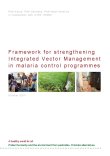 A decision making tool to support sustainable malaria control and the phase out of DDT, for funders, malaria program officials and all those interested in the issue.
A decision making tool to support sustainable malaria control and the phase out of DDT, for funders, malaria program officials and all those interested in the issue.
Combating Malaria without DDT: An ecosystem and community approach in Beer, Senegal
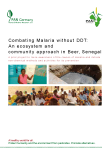 A pilot project to raise awareness of the causes of malaria and initiate non-chemical methods and activities for its prevention
A pilot project to raise awareness of the causes of malaria and initiate non-chemical methods and activities for its preventionCombating Malaria without DDT in Beer, Senegal
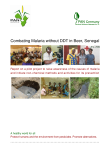 Report on a pilot project to raise awareness of the causes of malaria and initiate non-chemical methods and activities for its prevention
Report on a pilot project to raise awareness of the causes of malaria and initiate non-chemical methods and activities for its preventionPAN Germany Study "Environmental strategies to replace DDT and control malaria" (2nd extended edition)
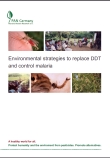 The Publication "Environmental strategies to replace DDT and control
Malaria" is now available as a 2nd extended edition. In this new edition you
can also find information on Tanzania and India and the chapter on
non-chemical methods to control malaria is expanded.
The Publication "Environmental strategies to replace DDT and control
Malaria" is now available as a 2nd extended edition. In this new edition you
can also find information on Tanzania and India and the chapter on
non-chemical methods to control malaria is expanded. Combating Malaria - Without DDT! Malindi, an African Example
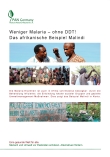 Malaria can be eradicated stepp by stepp in Africa - just as in other parts in the world - by treating people who are infected, involving local groups, and implementing targeted environmental management. This example from Malindi Kenya shows what can be achieved.
Malaria can be eradicated stepp by stepp in Africa - just as in other parts in the world - by treating people who are infected, involving local groups, and implementing targeted environmental management. This example from Malindi Kenya shows what can be achieved. Download of the leaflet (407 kb)
Control malaria without DDT!
There are more options than currently used
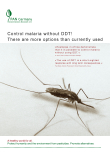 This 6 pages A4 flyer gives an overview on methods to control malaria in the
field of prevention, pathogen control and vector control.
This 6 pages A4 flyer gives an overview on methods to control malaria in the
field of prevention, pathogen control and vector control.Press Release dated April 19th, 2010
Phasing in Alternatives to DDT
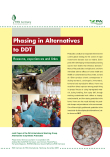 The PAN leaflet "Phasing in alternatives to DDT" gives an overview of the environmental and health problems related to the use of DDT, it informs about the global production, use and stocks of DDT and it informs about the international legislation. The main focus is laid on the description of existing alternatives to DDT. Examples are given from Asia, Africa and Latin America where successful vector control had been carried out without DDT.
The PAN leaflet "Phasing in alternatives to DDT" gives an overview of the environmental and health problems related to the use of DDT, it informs about the global production, use and stocks of DDT and it informs about the international legislation. The main focus is laid on the description of existing alternatives to DDT. Examples are given from Asia, Africa and Latin America where successful vector control had been carried out without DDT. Download (pdf-file, 612 kb)
PAN Germany Study "DDT and the Stockholm Convention - States on the edge of non-compliance"
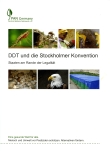 Objective of the Stockholm Convention is to protect human health and the environment from persistent organic pollutants by eliminating such chemicals globally. One of these hazardous chemicals is DDT – which is still being used in vector control programs. This study shows that many players and financiers of malaria control programs do not comply with the requirements of the Stockholm Convention.
Objective of the Stockholm Convention is to protect human health and the environment from persistent organic pollutants by eliminating such chemicals globally. One of these hazardous chemicals is DDT – which is still being used in vector control programs. This study shows that many players and financiers of malaria control programs do not comply with the requirements of the Stockholm Convention.
Download (1,4 MB)
Download of the brochure in German language (1 MB)
© 2018 PAN Germany Seitenanfang PAN Germany, E-Mailvalidieren

